Ukraine conflict: US 'may supply arms to Ukraine'
- Published
President Barack Obama: "The possibility of lethal defensive weapons is one of those options that is being examined"
President Barack Obama says the US is studying the option of supplying lethal defensive arms to Ukraine if diplomacy fails to end the crisis in the east.
Russia had violated "every commitment" made in the failing Minsk agreement, he added, after talks with the German chancellor on a new peace deal.
Mr Obama has come under pressure from senior US officials to supply arms, despite objections from Angela Merkel.
Russia denies accusations of sending troops and supplying the rebels.
The latest diplomatic efforts come amid renewed fighting between the pro-Russia rebels and Ukrainian government troops, with fighting centred around the strategic railway hub of Debaltseve.
The rebels said on Monday they had cut off a key supply road to the town, which is near the rebel-held city of Donetsk, but the military says the battle is ongoing.
Ukrainian government officials say nine soldiers and at least seven civilians have been killed in fighting over the last 24 hours.
The crisis in Ukraine has already claimed more than 5,300 lives and displaced 1.5 million people from their homes.
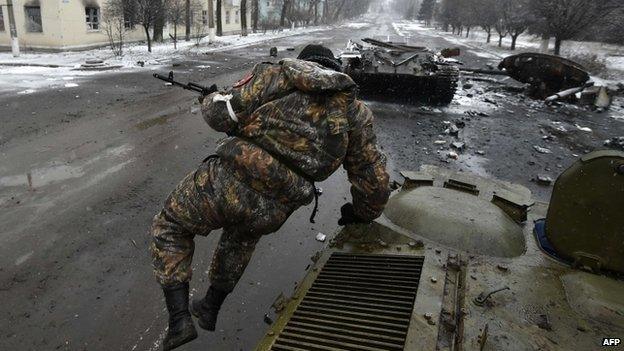
Mrs Merkel's US trip is the latest in a flurry of diplomatic activity to try end nearly a year of conflict in Ukraine
Mrs Merkel met the US president in Washington on Monday to update him on Franco-German efforts to revive last year's Minsk peace plan, which collapsed amid fighting over the winter.
The detailed proposals have not been released but the plan is thought to include a demilitarised zone of 50-70km (31-44 miles) around the current front line.
Four-way talks between Russia, Ukraine, Germany and France are due to be held in Belarus's capital Minsk on Wednesday to discuss the proposals.
'One option'
Speaking alongside the German chancellor, President Obama said the option of lethal defensive weapons for the Ukrainian government remained on the table.
"If, in fact, diplomacy fails, what I've asked my team to do is to look at all options," he said, adding that offering lethal arms was only one of the options under consideration.
Mrs Merkel, who has made it clear she opposes sending lethal arms, acknowledged setbacks in efforts to reach a diplomatic solution with Russia over Ukraine, but said that they would continue.

Analysis - Jon Sopel, North America editor
So does this mean (and does Vladimir Putin hope) that there is an irreparable fissure between the US and Europe over what to do about Ukraine ?
Well, probably not.
What has been most remarkable so far is the extent to which the European countries and the US have worked together on putting together and maintaining a sanctions regime against Russia, even though it could easily be argued that sanctions cost the US little, but hurt Europe a great deal.

Meanwhile Mr Obama criticised Russian aggression in Ukraine, saying that the borders of Europe could not be "redrawn at the barrel of a gun".
But this Russian aggression had reinforced the unity of the US and its European allies, he added.

EU foreign ministers in Brussels agreed on Monday to impose further sanctions against Russian and rebel officials, but have put them on hold for a week to give the peace efforts a chance.
Russian President Vladimir Putin, who is also considering the peace proposals, earlier blamed the West for causing the crisis, saying they had broken pledges not to expand Nato and forced countries to choose between them or Russia.
In comments to an Egyptian newspaper, Mr Putin accused Western states of supporting a "coup d'etat in Kiev" - a reference to the ousting of former Ukrainian President Viktor Yanukovych last year.
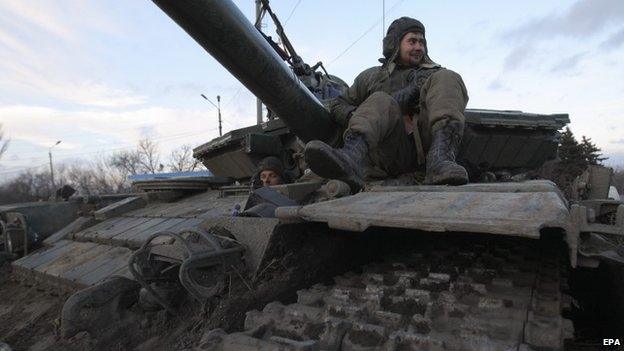
Ukrainian troops rest on a tank
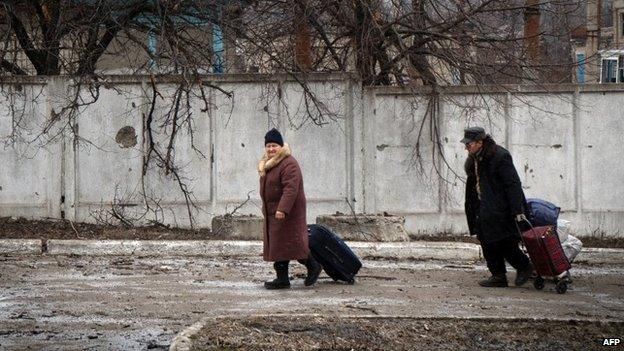
Many civilians have fled the Donetsk fighting
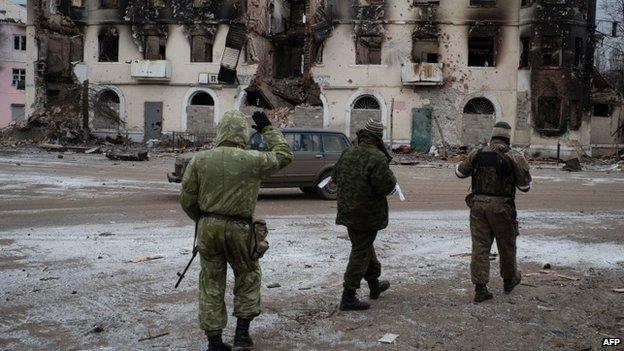
Pro-Russian rebels in the east Ukrainian town of Vuhlehirsk
He lost power amid protests over his decision to scrap a deal that would have seen Ukraine establish closer ties with the European Union.
Since then, Russia has annexed Ukraine's Crimea Peninsula and rebels in the east have sought to establish full control over the regions of Donetsk and Luhansk.
Giving more details on the fighting near Debaltseve, Russian-backed rebels claimed that taking the village of Lohvynove had helped them cut the main supply route.
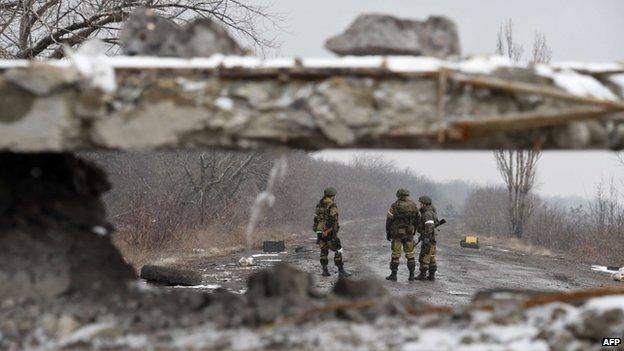
Much of the recent fighting has taken place around Debaltseve - a key piece of territory in the east
However, Ukraine's military spokesman Olexandr Matuzyanyk gave a different version of events, telling the BBC "there is fighting going on for this road at the moment".
Thousands of Ukrainian troops are believed to be in Debaltseve and the nearby area. Heavy fighting has been raging there for more than a week, with the rebels gaining some ground.
Germany's recent peace efforts have come under sharp criticism from senior US Republicans, who are calling for the provision of lethal arms to Ukraine.
"The Ukrainians are being slaughtered and we're sending them blankets and meals. Blankets don't do well against Russian tanks," Senator John McCain told an international security conference in Munich at the weekend.
US Secretary of State John Kerry has denied any rift with EU leaders, stating that they remained "united" and were "working closely together".

What was the Minsk agreement?
A ceasefire signed by Ukraine and pro-Russian separatist rebels on 5 September 2014 in Minsk, Belarus
They agreed to 12 points including pulling back heavy guns by at least 15km (9 miles), releasing prisoners, allowing access to international observers, and setting up a buffer zone on the Russia-Ukraine border. Foreign mercenaries were to withdraw and Donetsk and Luhansk would get wider self-rule
But military clashes never entirely stopped. Each side accused the other of violating the deal and violence later flared the length of the ceasefire line
Rebels also held their own local elections in November 2014, in defiance of Kiev. The government responded by saying it would scrap partial autonomy for Donetsk and Luhansk